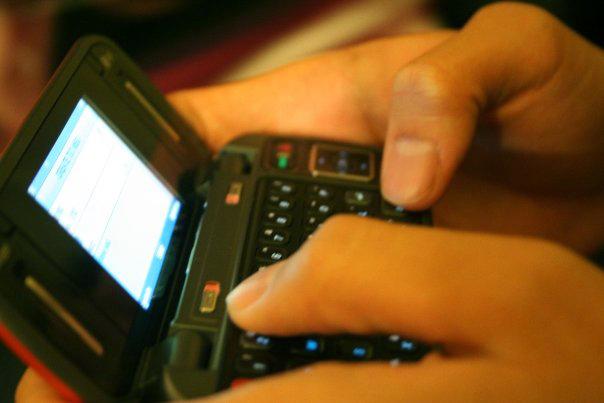‘LOL we rly like 2 txt.’
March 1, 2011
Look around you. What’s in your pocket? Do you hear that faint vibrating sound? Do you hear it even when it’s not there? Nowadays, it is unusual when someone does not own a cell phone and isn’t putting those opposable thumbs to good use on a text message. Text messages, or SMS, have drastically increased in popularity because of their convenience, ease of use (for those under thirty) and instant response. In our love and need for speedy communication, texting has become the perfect way to stay connected while multitasking. The sheer convenience of the service has grown to be more than a phenomenon—companies now offer instant discounts and coupons through texts, and users can tweet, update their Facebook status and upload pictures all through a text.
But are we really communicating? The human aspect of actually speaking and exchanging messages seems to be lost in every 160-character message. Whatever happened to calling someone? What happened to actually hearing your friend’s voice? I admit, I am constantly walking around campus perfecting the art of typing and walking simultaneously, but the notion of simply calling someone back is starting to become archaic. I become concerned if a friend calls and instantly worry if something is wrong. I, among with many others, have become trained to text whenever I need something instead of opting for the faster choice of calling.
Don’t get me wrong, I am completely on the side of technology. In recent news, technology has served a purpose through the revolutions in the Middle East and helped topple dictators through Twitter and Facebook. Moreover, technology is constantly growing and reshaping itself. Apple will soon be releasing the iPad 2, and at this rate, we have fast-forwarded development to such an extent that new technology becomes obsolete in less than a year. Texting, which itself has evolved from basic “ABC” mode to “T9” to developing QWERTY keyboards in new cell phone models, is becoming the most convenient mode of communication. You can easily talk to a friend where you cannot call them, like in a library, outside where it may be too loud, or, let’s face it, in class.
When you call someone, multitasking becomes harder since you actually have to pay attention to the words you use. Plus, what if your friend is in the middle of something? You could possible be disturbing them. But then what’s the point of actually talking to someone? Has the simple act of talking become a chore? If texting is easily accomplished while multitasking, how much importance do we place to our “conversations”?
Unfortunately, I am also guilty of texting in the middle of a conversation and paying more attention to my phone’s screen than the person in front of me. The truth is, we have grown accustomed to having multiple conversations while listening to music, writing an essay, and of course, checking our news feeds. Impersonal conversations are far too commonplace, and perhaps the only people I actually call are my parents, who insist that calling a person is far easier and more comforting than sending a text.
In a way, many people text to hide behind their words. There is no need for facial expressions, tone of voice or emotion, all of which are required in everyday conversation. Flirting and dating become easier since messages grant people a few extra seconds to come up with the perfect witty remark, whereas a response is expected immediately in person. People who constantly text each other could be at a loss of words when they actually meet, further proving that our sense of communication is disconnecting. Despite knowing this, I was ecstatic when I got an unlimited texting plan, and I now send at least a thousand texts per month. One thousand, however, is not a staggering number. According to a CNN news report from October 2010, teenagers (ages 13-17) sent an average of 3,339 texts a month compared to just 1,700 texts in 2008. Those between the ages of 18 to 24 sent an average of 1,600 texts a month.
So what does this mean for the future of communication? Are we turning into drones that can satisfy our communication with the world with an occasional Skype call or Facebook chat? Though technology has giving us the opportunity to keep in touch, we may be granted a little too much freedom. A recent application, Breakup Notifier, monitors anyone’s relationship status on Facebook and sends users an email whenever it changes. Though Facebook banned the website, the service may soon be back for use.
Even if it is through creepy means, technology has kept us up to date with those around us right from our computer and cell phone screens. Calling someone, however, should not have to be a daunting task. We should not be hoping to reach the voicemail instead of actually talking to someone on the other line. And we certainly should not rush to create a new message every time we attempt to catch up with a friend. Instead, stop worrying whether or not you’re disturbing someone, step away from your computer and actually go through your phonebook and make a call. Who knows, you might surprise yourself and actually start using your phone for something other than typing.
To contact the Ionian’s Ranisha Singh, e-mail her at [email protected]







